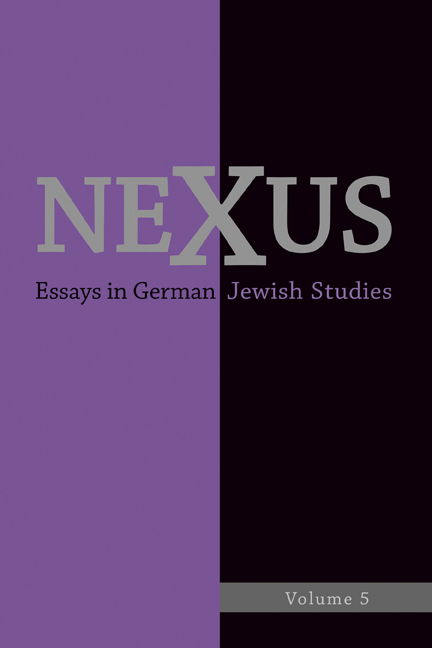 Nexus: Essays in German Jewish Studies, Volume 5
Nexus: Essays in German Jewish Studies, Volume 5 Published online by Cambridge University Press: 24 March 2021
For Jonathan, in fond memory and in debt
JONATHAN HESS concludes his introduction to German, Jews and the Claims of Modernity (2002) with one of the central paradoxes of modernity. On the one hand, modernity is predicated on a break. It is a discourse that “envision[s] a new and secular world that claimed its legitimacy not with reference to the various traditions and legacies of the past it sought to overcome, but solely in relation to itself.” On the other hand, modernity is defined through its relationship to the past: “In its claim to radical novelty, the discourse of modernity had to negotiate its relation to the historical past and secure its position as the heir to the entirety of history itself” (Hess, 22). This contradictory dynamic—modernity's attempted break with history reinforces its deep ties to history—belongs to the broader story of Hess's book. The Enlightenment project of universalism and secularism is indissolubly, maybe fatally, bound up in the freighted past of Christian evangelism, colonialism, and anti-Judaism. But in his treatment of Jewish authors writing from a marginalized position, Hess also brings out the creative processes of modernity, the more inventive negotiations between past and present, religious identity and civic tolerance, that aim toward “a vision of religious reform that recuperates Judaism for modernity at the same time as it issues a challenge to emergent concepts of political universalism whose link to the Christian legacy were in desperate need of clarification” (Hess, 18). Hess's book thus immerses us deeply in the competing Christian and Jewish efforts to translate tradition into modernity. These eighteenth-century religious struggles, whether overt or covert, have shaped to an extraordinary degree the models of religious and civic pluralism that remain with us today.
One of the primary discursive battlefields for German religious modernity becomes, not surprisingly, Jesus, the figure defining the very boundary between the two religions. Those making a bid for Christianity's unique suitability for the modern age were determined to show that the religion transcended its historical connections to Judaism; they therefore strived to view Jesus in isolation from his historical Jewish context (Hess, 12); Jewish authors, conversely, came to insist on that context.
To save this book to your Kindle, first ensure [email protected] is added to your Approved Personal Document E-mail List under your Personal Document Settings on the Manage Your Content and Devices page of your Amazon account. Then enter the ‘name’ part of your Kindle email address below. Find out more about saving to your Kindle.
Note you can select to save to either the @free.kindle.com or @kindle.com variations. ‘@free.kindle.com’ emails are free but can only be saved to your device when it is connected to wi-fi. ‘@kindle.com’ emails can be delivered even when you are not connected to wi-fi, but note that service fees apply.
Find out more about the Kindle Personal Document Service.
To save content items to your account, please confirm that you agree to abide by our usage policies. If this is the first time you use this feature, you will be asked to authorise Cambridge Core to connect with your account. Find out more about saving content to Dropbox.
To save content items to your account, please confirm that you agree to abide by our usage policies. If this is the first time you use this feature, you will be asked to authorise Cambridge Core to connect with your account. Find out more about saving content to Google Drive.